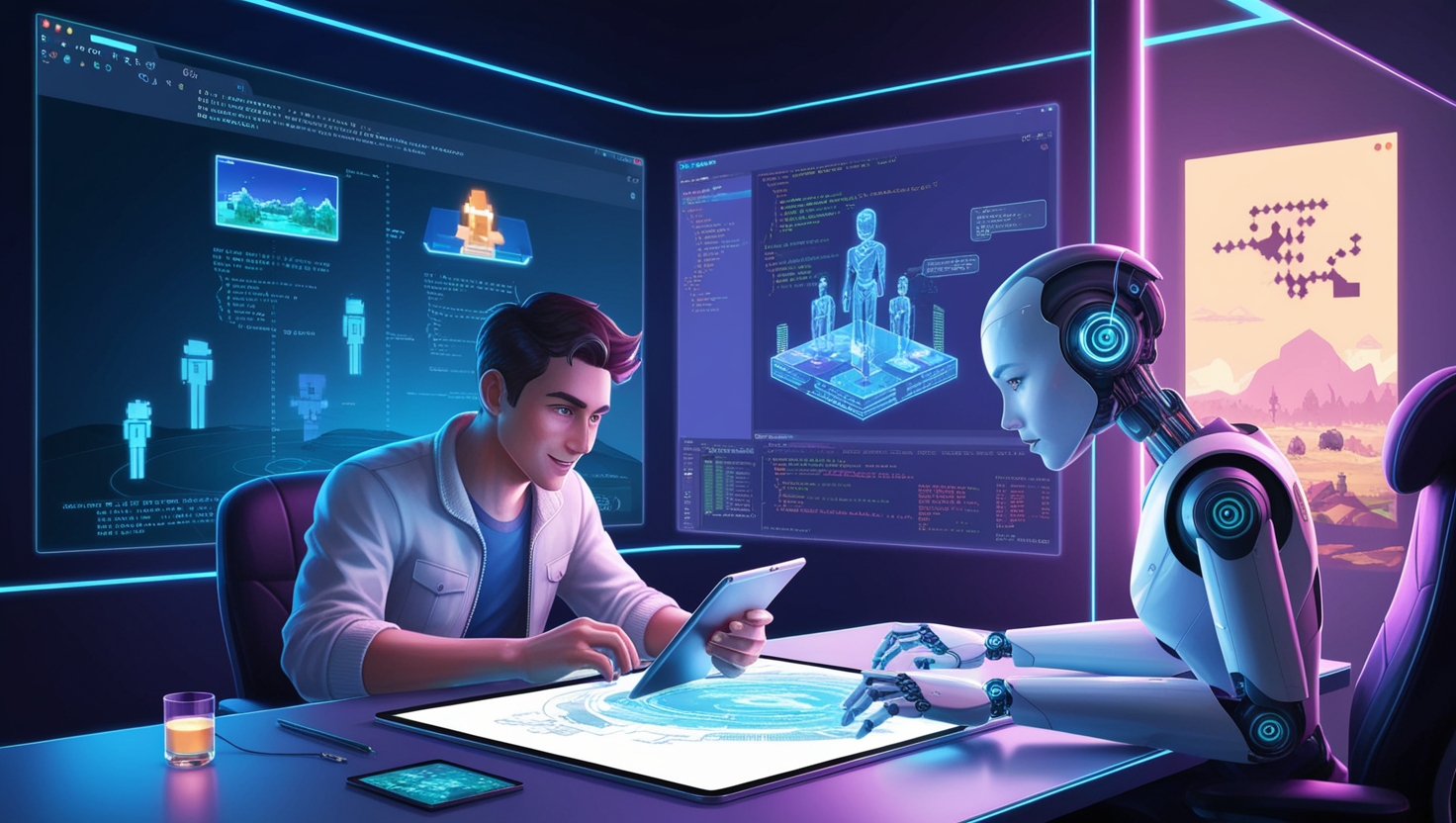
AI (Artificial Intelligence) has quickly progressed in recent years from a futuristic idea to a commonplace tool in game production. Generating 3D textures and testing gameplay loops made AI a powerful tool for modern studios.
But will AI replace human game developers? Not quite. At Melior Games, we believe AI is enhancing, not erasing, human creativity—and in this article, we’ll explore:
- Why AI won’t make game developers obsolete
- Which tasks are now easier thanks to AI tools (compared to 10 years ago)
- What AI makes possible today that was impossible 30 years ago
🧠 Why AI won’t replace game developers
Game development is more than just code and content; it’s storytelling, emotion, design intuition, and player psychology. AI still lacks the human elements that make great games memorable, even while it excels at carrying out preset tasks and analysing massive data sets.
- Creative vision: AI can remix, but not invent compelling characters or worlds from scratch with emotional depth.
- Player empathy: People are aware of humour, trends, culture, and time. It is crucial for creating connected experiences.
- Design balance: AI can optimize mechanics, but it doesn’t understand the “feel” of fun or challenge without human guidance.
- Moral and ethical judgment: Games frequently explore sensitive subjects that AI cannot completely understand or assess properly.
Developers should therefore see AI as a co-pilot and assistant on the creative journey rather than as a replacement.
⏳ Over the past ten years, AI has made tasks easier
AI has simplified many of the processes that once required days or weeks of human labor in game production.
🎨 1. Procedural Content Generation
- AI-based algorithms procedurally create vast open worlds, dungeons, and levels.
- Programs like Houdini and Unity procedural tools are used to automate the construction of repetitive landscapes.
🖼️ 2. Art and Texture Scaling
- Low-cost AI algorithms improve textures and visual effects.
- AI-based style transfer can instantly adapt assets to different art styles.
🧑💻 3. Code suggestions and autocomplete
- Debugging, refactoring, and scripting have become simpler with AI-powered IDEs.
- They reduce boilerplate code and help new developers learn faster.
🧪 4. Automated QA and testing
- AI-powered bots help to uncover flaws, edge cases, or pathfinding problems during game tests.
- Great choice for testing large maps or dynamic systems that are difficult to cover manually.
🧠 5. Predicting Player Behavior
- AI assists in predicting player churn or irritation points by analysing gaming parameters.
- Permits data-driven UX enhancements and more intelligent A/B testing.
🕹️ What’s possible now that wasn’t possible 30 years ago
Let’s go back to the mid-1990s. Basic logic, limited hardware, and manual procedures continued to be the main constraints on game production. Here’s what AI is enabling now that would have been science fiction back then:
🌍 1. Massive open worlds with dynamic AI
Think of Elden Ring, Starfield, or No Man’s Sky.
In contrast to the pixel games of the 1990s, AI creates environments with live ecosystems, emergent behaviour, and reacting NPCs.
🎙️ 2. AI-powered voice and dialogue generation
Using programs like ElevenLabs or Replica Studios, developers may create AI-generated voice acting with emotions and lip-syncing, saving them time and money.
Large language models, or LLMs, fuel real-time dialogue trees that make conversations come to life.
🧠 3. Intelligent NPCs with real-time decision-making
These days, AI-powered NPCs respond to changes in their surroundings, adjust to player movements, and even “learn” over time.
Contrast this with the 1995 era’s predictive pathfinding of adversaries.
🎨 4. AI-powered asset generation
Concept art, procedural textures, and even character animations can now be created with AI in minutes, something that used to take teams.
🕹️ 5. AI-powered game design prototypes
With instructions, AI can now assist in creating UI mockups, feature lists, and complete game mechanics.
This allows small indie teams to create prototypes that would have required a large staff a decade ago.
⚖️ Human + AI = The Future of Game Development
Not only will AI design games in the future, but it will do it under the guidance of experienced people who understand how to use it efficiently.
At Melior Games, we are using AI tools in our projects for cost and time efficiency, especially at the first stages of development. Creating simple mobile games, as well as intricate multiplayer systems, requires a successful blend of technology and human narrative.
🚀 Build the future with Melior Games
Let’s work together if you have an idea for a game that is cutting edge, scalable, and future-ready. At Melior Games, we combine advanced AI-powered tools with decades of human experience. We provide full-cycle game development services: design, code, test, and publish.
Let’s create a smart game that looks great and is even better to play.
🎮 Contact Melior Games, and let’s shape the future of interactive entertainment together.




